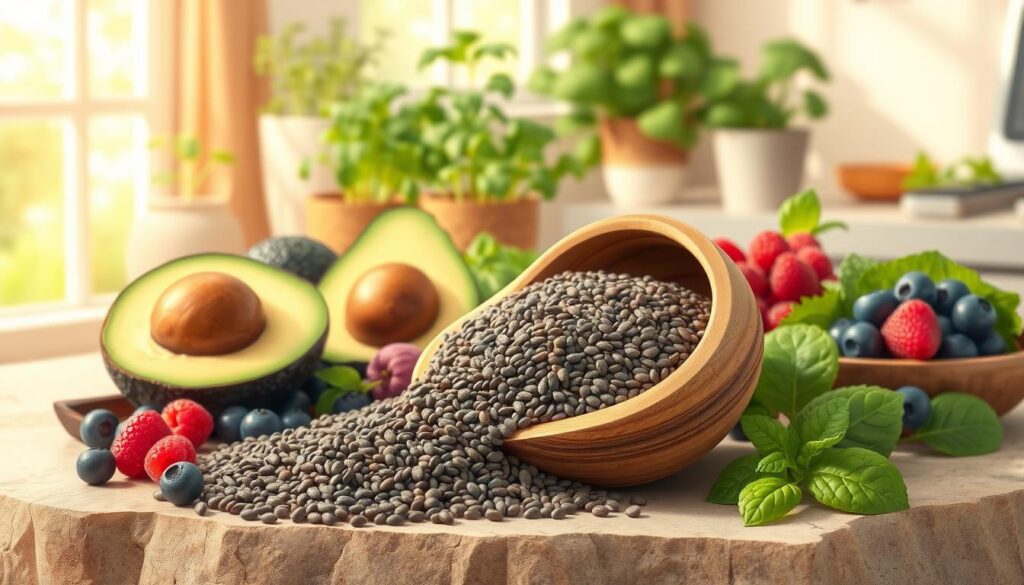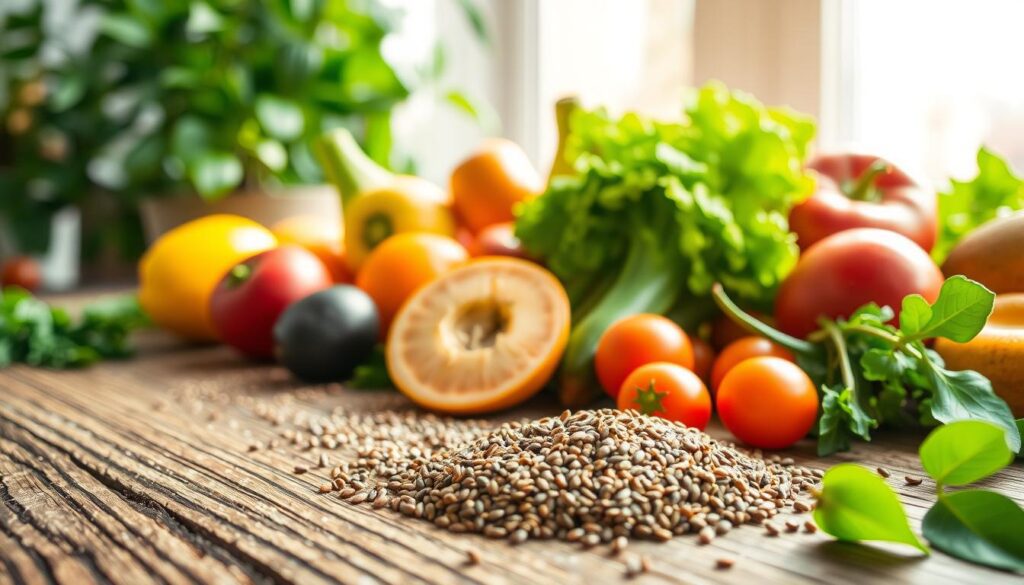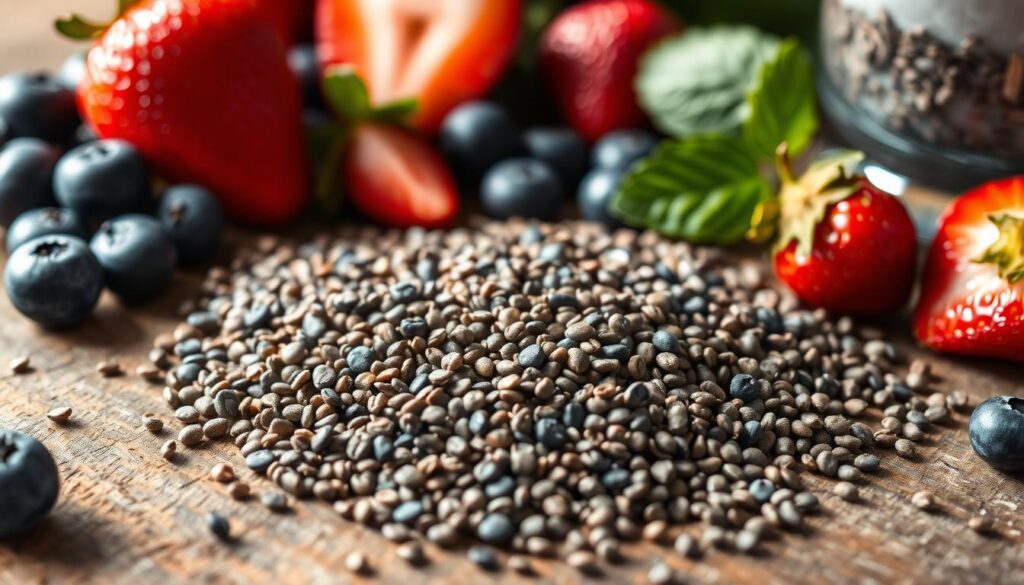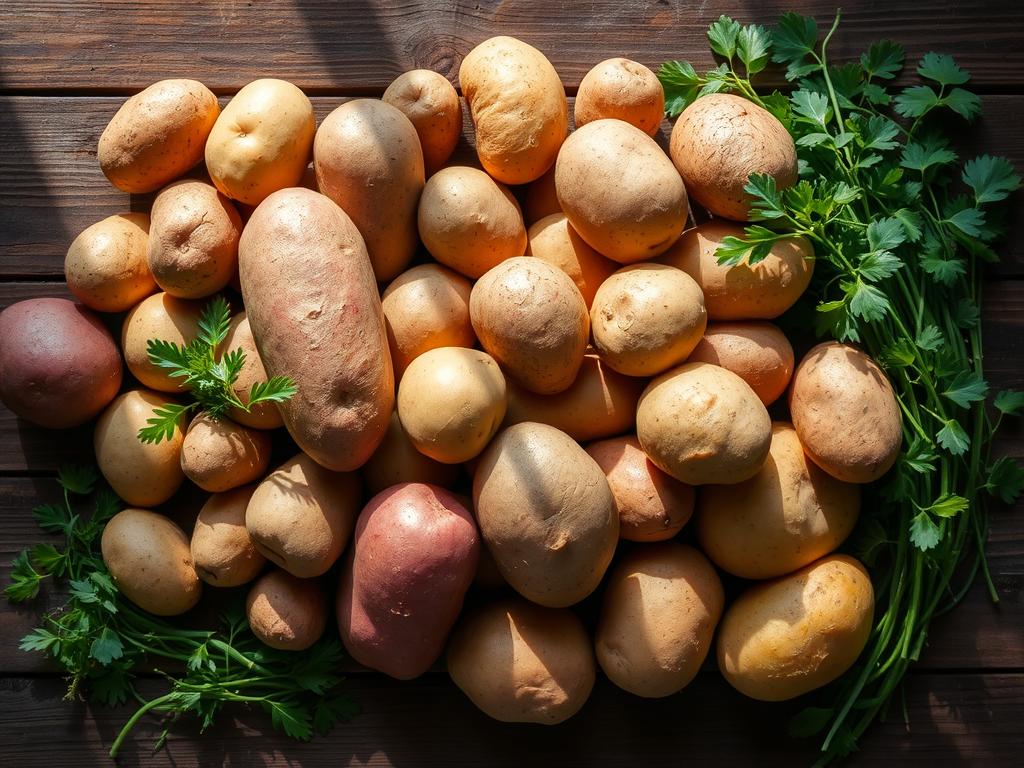Chia Seeds: Benefits, Uses, and Nutritional Powerhouse
Did you know that just one ounce (28 grams) of chia seeds packs approximately 138 calories along with 9.8 grams of fiber? This tiny seed, derived from the flowering plant Salvia hispanica, is celebrated as a superfood, making it a favorite among health enthusiasts and culinary explorers alike.
Historically, chia seeds were cherished by ancient Aztec and Mayan civilizations for their health benefits. Modern research continues to emphasize their importance in a balanced diet. Not only are chia seeds gluten-free and vegan, but they also serve as an excellent source of omega-3 fatty acids, plant-based protein, and essential minerals.
Read on to explore the incredible benefits and versatile uses of this fiber-rich ingredient, which has captured the interest of nutritionists and food lovers worldwide.
Key Takeaways
- Chia seeds contain abundant nutrients including omega-3 fatty acids and plant-based protein.
- These seeds offer a high fiber content, promoting digestive health and aiding in weight loss.
- Chia seeds are versatile, easily incorporated into gluten-free and vegan diets.
- Rich in antioxidants, chia seeds may provide heart and liver health benefits.
- Just one ounce of chia seeds contributes significantly to daily calcium, magnesium, and iron intake.
What Are Chia Seeds?
Chia seeds, derived from the plant Salvia hispanica, are small black or white seeds celebrated for their remarkable nutritional benefits. These seeds have roots in ancient civilizations, where they served not only as a dietary staple but also as a medicine. Recognized today as a premier health food, chia seeds boast a nutrient-rich profile that includes omega-3 fatty acids, high fiber content, and an array of essential minerals.

One notable feature of chia seeds is their impressive fiber content, offering approximately 30–34 grams per 100 grams. This includes both insoluble and soluble dietary fiber. The seeds are also known for their high levels of polyunsaturated fatty acids, particularly alpha-linolenic acid (ALA), making up about 60% of their total fatty acid composition. Chia seeds surpass flaxseed in omega-3 fatty acid content, which contributes significantly to their popularity as a nutrient-dense food option.
Rich in plant protein, chia seeds constitute around 18–24% of their mass in protein, making them a valuable addition to vegetarian and vegan diets. Additionally, they are gluten-free, catering to individuals with celiac disease. The wealth of minerals found in chia seeds—such as calcium, phosphorus, and magnesium—further solidifies their status as a whirlwind of nutrients.
As a versatile ingredient, chia seeds can be integrated into a variety of meals. Their ability to absorb liquid allows them to expand, creating a gel-like texture ideal for puddings, smoothies, and baked goods. Incorporating chia seeds into daily meals offers a simple approach to enhance nutrient intake and overall health.
Chia Seeds: Benefits, Uses, and Nutritional Powerhouse
Chia seeds are celebrated for their highly nutritious profile, making them a popular choice for those seeking to enhance their diets. Packed with essential nutrients, chia seeds provide a rich array of vitamins, dietary fiber, and healthy fats, particularly omega-3 fatty acids. These seeds make an excellent addition to a balanced meal plan, offering significant health benefits.
Highly Nutritious Profile
A typical serving of chia seeds provides approximately 10 grams of fiber, fulfilling nearly 30% of the daily recommended intake for adults. In addition to fiber, they are a strong source of protein and healthy fats, which contribute to overall wellness. The nutrient density of chia seeds supports various health goals, including heart health and weight management.
Rich Source of Antioxidants
Chia seeds are also recognized as a rich source of antioxidants, such as chlorogenic acid and caffeic acid. These compounds help protect the body from oxidative stress, potentially reducing inflammation and lowering the risk of chronic diseases like heart disease and cancer. Incorporating chia seeds into your diet can be a simple yet effective way to boost your intake of beneficial nutrients.

Health Benefits of Chia Seeds
Chia seeds provide a multitude of health benefits that contribute to overall wellness. Their rich nutritional profile supports various aspects of health, particularly for those looking to enhance heart health, manage weight, and improve blood sugar control.
Supports Heart Health
One of the standout features of chia seeds is their high content of omega-3 fatty acids, which play a crucial role in promoting heart health. This healthy fat contributes to lowering cholesterol levels and reducing blood pressure. Regular consumption of chia seeds may help prevent heart disease, making them a smart addition to a heart-healthy diet.
May Aid in Weight Loss
The fiber present in chia seeds is known to create a feeling of fullness, which can lead to a natural reduction in caloric intake. As they expand in the stomach when soaked, chia seeds can help curb appetite. This effect makes them a valuable tool for those battling obesity and looking for effective weight loss strategies.
Improves Blood Sugar Control
Chia seeds may enhance blood sugar control, showing promise for individuals managing diabetes. Research indicates that they can improve insulin sensitivity and moderate post-meal blood sugar spikes. This characteristic is particularly beneficial for those seeking to stabilize blood sugar levels associated with metabolic syndrome or type 2 diabetes.

How to Incorporate Chia Seeds into Your Diet
Chia seeds are exceptionally versatile, making it easy to incorporate chia seeds into your daily meals. These tiny superfoods can be consumed whole or ground, and they blend seamlessly into smoothies, oatmeal, yogurt, and baked goods. One of the most popular recipes is chia pudding, where the seeds absorb liquid and develop a delightful gel-like consistency. To prepare this dish, simply mix a quarter cup of chia seeds with one cup of your preferred liquid, such as almond milk or fruit juice, and let it sit in the fridge for about an hour or overnight.
Easy Recipe Ideas
In addition to chia pudding, there are numerous creative recipes that highlight the nutritional aspects of chia seeds. They can be sprinkled on salads, added to soups, or mixed into grain bowls for an extra boost. Chia seeds also work well in snacks, such as energy bars or smoothies, where they can enhance both the texture and the health benefits. Feel free to experiment with flavors by incorporating spices, fruits, or natural sweeteners. Remember to drink plenty of water when consuming chia to ensure proper digestion and hydration.
Using Chia Seeds as a Binding Agent
Another fantastic way to incorporate chia seeds is by using them as a binding agent in various recipes. They can replace eggs in vegetarian options like veggie burgers or meatballs, improving the texture while adding essential nutrients. To use chia seeds in this way, mix one tablespoon of seeds with three tablespoons of water and let it sit for about 10 minutes until it thickens into a gel. This mixture not only enhances the dish’s nutritional profile but also maintains the original flavors, making it an ideal addition for anyone looking to enhance their dietary sources with these superfoods.











